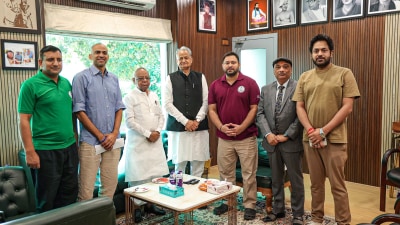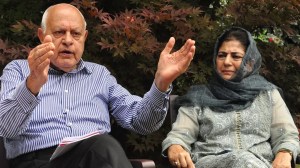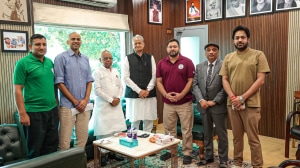BJP on the horns of an Uma dilemma
Far from rejoicing at the Karnataka government’s volte face on the Uma Bharati issue, the BJP leadership is in a quandary on what to do...

Far from rejoicing at the Karnataka government’s volte face on the Uma Bharati issue, the BJP leadership is in a quandary on what to do with the fiery sanyasin in case the Sessions Court quashes the case against her and releases her from judicial custody.
There are sharp divisions within the BJP on whether Bharati should be reinstated as Madhya Pradesh Chief Minister—barely a week after she vacated the post, or whether she should remain the party’s ‘‘star campaigner at large,’’ even though her release would take out much of the steam from the projected “tiranga yatra,” well placed sources said.
Top party leaders met here this morning to discuss the latest twist in the Uma Bharati tale. The meeting decided that Advani and Naidu would fly to Bangalore as planned tomorrow but the nature of the proposed “satyagraha” would depend on the nature of the court verdict.
The real dilemma before the party, though, is not whether or not to carry on the satyagraha but how to deal with Bharati. A section of the BJP leadership, including party chief Venkaiah Naidu, is believed to be in favour of reinstating her as chief minister. Since she was forced to give up the post “only because of the non-bailable warrant” against her, she should get back her job if the case is dismissed.
But the reverse view, which ironically has the backing (albeit for different reasons) of both her adversaries in Madhya Pradesh and her well-wishers in Delhi, is that Uma should not return to Bhopal so soon after a new man has taken over.
One BJP leader said, ‘‘Even Ram let Bharat rule Ayodhya for 14 years. How can you remove poor Babulal Gaur just a week after he was sworn in?”
|
Babulal Gaur shows everyone who the Boss is
|
|||||
|
• In Bhopal, CM Babulal Gaur, who’s ‘‘ready to step down if asked by the central BJP leadership,’’ has already rolled back many of Uma’s decisions: |
|||||
Moreover, it is well known that Bharati was not exactly the most popular person within the state party unit. There was open dissidence against her “whimsical” style of functioning and “nepotistic tendencies.” For many of her detractors, the “tiranga case” came in handy to get rid of a difficult leader. But if she returns to state politics—minus the halo of martyrdom denied her by the Dharam Singh government—the levels of dissidence may only grow, sources said.
Like the anti-Uma section in Madhya Pradesh, her “well-wishers” also do not want Uma to return as CM. A Sangh Parivar insider said, ‘‘It was thanks to Uma’s tireless campaigning that the BJP won a massive majority in Madhya Pradesh. But running an administration is not her forte; being a mass campaigner is. Uma has outgrown Madhya Pradesh politics and should return to the national stage.’’
This section believes that Uma’s status as the most popular mass leader in Madhya Pradesh is under no threat. “In Bhopal, she will always remain Super CM—Babulal Gaur will be to her what Manmohan Singh is to Sonia Gandhi. But with the BJP in opposition, she will be far more useful as a mass campaigner throughout the country.”
But Generation Next leaders—the names of Venkaiah Naidu and Sushma Swaraj are being mentioned in particular—are not too keen on the idea, sources said. Although there is no truth to reports that the RSS is backing Uma as a replacement for Naidu, the induction of Uma in the national leadership could pose a long term threat to the existing second rung leaders, it is felt.
According to sources, in case the majority view against reinducting her CM prevails, she will not be given a central post straightaway. Instead, she will be drafted in the Maharashtra election campaign.
While partymen in Delhi and Bhopal debate the pros and cons of the issue, much will depend on Uma Bharati’s own take on the matter. In case Uma insists on getting back her chief ministership, the leadership will find it difficult to go against her.
The best option for the BJP, leaders privately concede, is for Uma to remain in jail, giving her the halo of martyrdom and her party a potent issue for campaign. But the court, they fear, is unlikely to oblige.





- 01
- 02
- 03
- 04
- 05


























